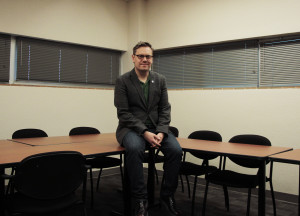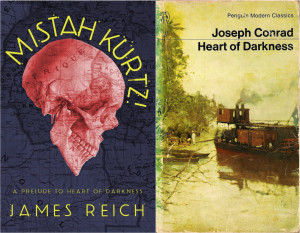Tags
Related Posts
Share This
Reich Revives Kurtz

James Reich, author of the upcoming novel Mistah Kurtz! appropriately teaches modernist literature for SFUAD’s Creative Writing and Literature Department. Photo by Cydnie Smith-McCarthy
“Releasing a novel into the world is like dropping a baby from a high rise building and trusting that someone will open their window, reach out, and catch it before it hits the ground,” says James Reich, Creative Writing and Literature faculty member and author of the soon-to-be published novel, Mistah Kurtz!
Deeming his latest work postmodern literary fiction, Reich describes Mistah Kurtz! as a prelude to Joseph Conrad’s infamous novel Heart of Darkness and adds that he is grateful to Anti-Oedipus Press for “catching” his third official novel and for slating its 2016 release.
“Heart of Darkness is such a closed book for so many people,” Reich says, considering his motives for a prequel. “We think we have all these certainties about it morally and aesthetically and I think if there’s one thing that I wanted to do it was to open the book back up. To destabilize those certainties. To stop thinking about Heart of Darkness itself as being canonically fixed.”
Reich shares that the mystery of Conrad’s main character Kurtz is the core of his investigations and fictional creations in Mistah Kurtz! His story, for example, revisits the letters Kurtz gives to Marlow at the end of Heart of Darkness and Reich utilizes first person perspective to solve the supposed madness of the famously impenetrable character.
“So it tells all the story that is implied about Kurtz in a concrete way,” Reich says. “His confession, his account of his childhood, his lies, his rise as a company man and an ivory collector, and his messianic disintegration. So where Heart of Darkness is impressionistic, [Mistah Kurtz!] is actually harder, more concrete and tries to put detail in terms of historical detail, dates and more specific places.”

James Reich’s newest novel Mistah Kurtz! (left) is written as a prelude to Joseph Conrad’s ‘Heart of Darkness’ (right). Courtesy of Anti-oedipus Press
A lot of the fun in writing a prelude to a well established text, Reich says, is recognizing patterns or “aligning Conrad’s mythology of Kurtz with history.” According to the author, this was done by considering historical context. Though Conrad doesn’t give specific dates and places in which the characters of Heart of Darkness were living, Reich imagines what Kurtz would be like if he had a relationship with King Leopold II of Belgium, for example, or how the Jack the Ripper murders would affect him if he were living in London. It is also an opportunity, Reich says, to explore answers to theories about Kurtz’s relationships to Conrad’s cryptic women characters, to Kurtz’s ancestry, his upbringing, his education. “All these questions that Conrad implies I have to answer to make Kurtz real,” Reich says. “To make him less of a ghost.
And his novel ends, Reich explains, in the pivotal moment where Marlow meets Kurtz in Heart of Darkness. In that way, “the two books dovetail together,” Reich says, “and you get the same ending, but from Kurtz’s perspective rather than from Marlow’s. So what is Kurtz thinking of Marlow as Marlow approaches from the river and tries to confide in him and what does he mean when he writes ‘exterminates all the brutes!’? We think we know that, but I’ve given a different, probably controversial take on it.”
And part of that take, Reich suggests, is more political, because though Kurtz’s madness is implied by the circumstances of colonialism, the reader is not privy to the historic situation. “I think Heart of Darkness is so impressionistic and obscure in some ways,” Reich says, “it’s almost possible to read it as a first contact novel, where as prior to the events of Heart of Darkness there had been European involvement. There were established trade routes and conflicts and histories that involved Europe already. Conrad tells you about absurdity and waste and suffering, but by not calling out King Leopold II, by not referring to the international situation…it is perhaps a flaw of the novel to be investigated.”

Reich considers himself a political writer in that he challenges the archetypes of classic literature. Photo by Cydnie Smith-McCarthy
When he began writing Mistah Kurtz!, Reich admits that it read much like a nineteenth century novel. He realized, however, that Kurtz’s voice demanded access.
“I had the idea that the book would have a relatively mainstream tone, to the extent that Conrad can be considered relatively mainstream. Even thematically it pushes buttons and transgresses, but I realized the voice of this character had to be slightly decadent and sane and tortured in many ways.”
He believes, however, that the novel’s voice and style fit well into his signatory and antagonistic relationship with “the canon,” a class-based consensus of what is classic art. Because he considers himself part of the working class and theoretically excluded from that category, Reich says that whether it’s an archetype he’s attacked in his first novel I Judas or the idea of the thriller in his latest novel Bombshell, he is always looking to “interrogate and fuck with [the canon].” The writer adds that the great thing about “entering into the mythology of Conrad” is that Mistah Kurtz! is not meant to imitate classic style but to discover ways in which Heart of Darkness works as a novella.
In his research and construction of the novel, Reich also describes the similarities he found between the young rebellious writer Arthur Rimbaud of the late 1800s to Conrad’s character of Kurtz. Reich describes Rimbaud’s type as “ascendent and emerging,” and says it was interesting to him how both Kurtz in Heart of Darkness and Rimbaud in real life experienced their decline in Africa.
“All of my writing is deconstruction,” Reich says, observing once again his style and political activism in his work. “Is it regressive to raise Kurtz in the 21st century? Well, only if you believe that industrial capitalist notions of Africa have actually changed substantially. In terms of policy, civil rights in America, police brutality, for example, the attitudes of the Belgian Congo surround us.”
Reich adds that those same themes are part of his motivation for constantly challenging himself and making himself uncomfortable while writing.
“I think if you’re not uncomfortable, you’re not doing it right,” Reich says. “Writing is fundamentally going to those really difficult places and exploring them. One of the things my agent said to me after he read [Mistah Kurtz!] was, ‘you realize you’re going to take a lot of shit for this.’ So I said, ‘bring it on.’”






 Jackalope Magazine is the student magazine of Santa Fe University of Art and Design. Building on the interdisciplinary nature of our education, we aim to showcase the talent of our university and character of our city.
Jackalope Magazine is the student magazine of Santa Fe University of Art and Design. Building on the interdisciplinary nature of our education, we aim to showcase the talent of our university and character of our city.
Recent Comments